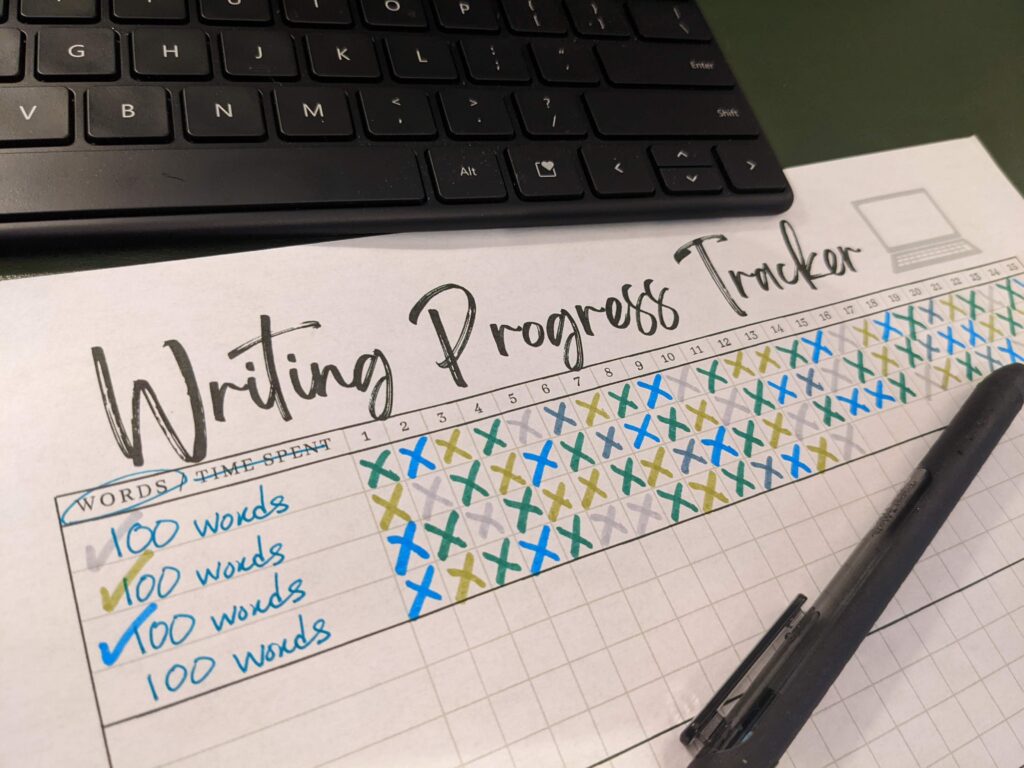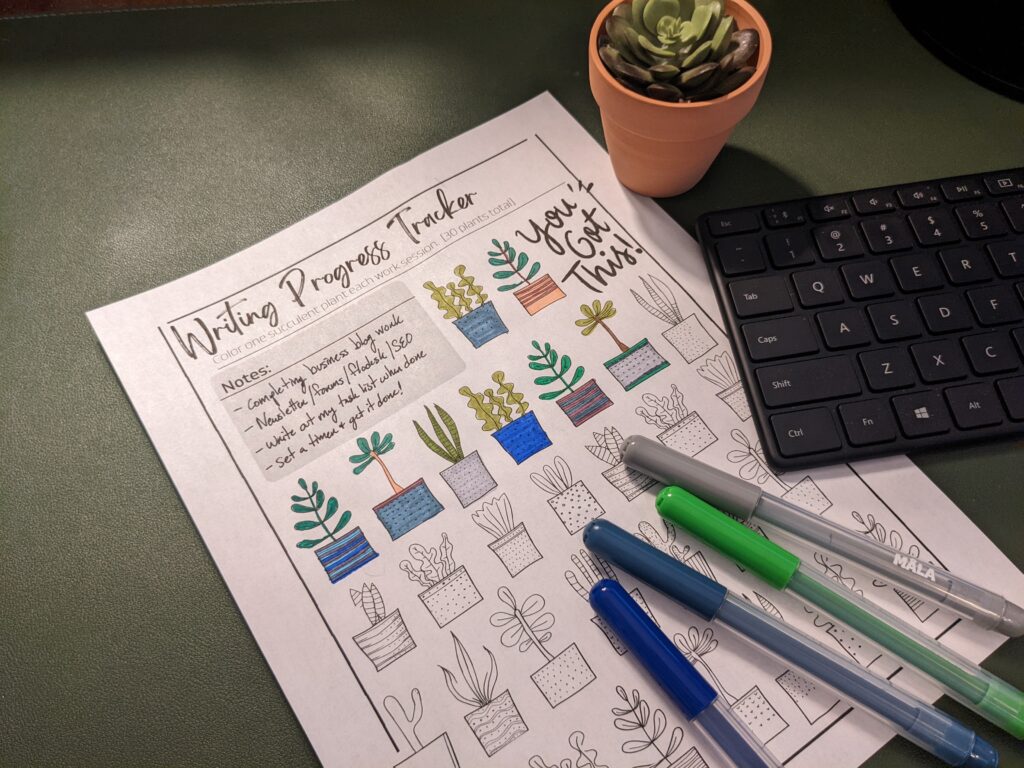Sitting on the back porch at a family party this summer my cousin Reed and I got into a conversation about writing. As she shared ideas and tips I got out my phone and furiously took notes. This article is full of great information from her. I appreciate that her approach is different than mine. Reed is a fiction writer primarily of secondary world Fantasy. (This is fantasy fiction taking place in other worlds.)
Make sure you check out the rest of the Writing Series –
Series Intro: Conversations About Writing with Reed Mingault
Here are some ways Reed uses to get focused on writing.
Focus & the Zone
Just start.
Getting started writing for the day can be tricky. Read back on what you write to kick you back into the mode of writing. Think to yourself, “here are the new words that I need to work on”. Sometimes you have to start with editing what you wrote before.
Change from laptop to a journal.
Writing something long-form kickstarts the creativity in your brain. Get out a pen and paper. You don’t have to do it for a long time, but it can help to switch modes of writing.
Use sketches.
Another way to get into the zone is warm-up and cool down sketches. These are ways to get started with some structure so you are not staring at a blank page. This is mostly an artist’s concept. It came from Reed’s drawing and art background. She makes amazing illustrations, doodles, and art that she shares on Twitter: https://twitter.com/MilvusScribe
Writers who use warmups journal about the topic they are working on. Instead of jumping into the prose of the work, they write about it. It is a noodling about the work. Stream of consciousness writing.
Fiction Warm-ups to try:
- Here are my thoughts on this scene.
- What do I want to accomplish in this setting?
- How do I feel about where this is going?
- What is the character feeling right now? How can I change that?
- What needs to happen next to change the character’s feelings about this scene?
Staying in the zone
Now that you have started working on your writing work, it is key to stay in the zone. Each day will be different and staying in the zone will take work.
Some ideas to try –
The key to staying focused is knowing what works for you.
Here is a piece from Reed’s blog:
“The new house brought all sorts of advantages. A safe space to work out how, exactly, it is I work best (the adhd diagnosis also helped there). A huge desk where I can have a relatively ergonomic set up finally! A DOOR that I can CLOSE against the rest of the house!!! I don’t always need to because smol’s in school (for now, omicron willing) and Partner works from the basement office, but it’s nice to have the option. And the space to spread out!”
“Reed in the New Year” – blog post
Writing can take many different paths. Our personalities, nerodiversity, and lifestyles can change how we get the work done. What you are using to stay focused this week might not work next week. And that is okay. Just keep trying and moving forward. Show up, do the work, and fill out your trackers. It is worth it.
The 1st Draft
The first draft is important. It is where we all must start. Putting words on the page must happen first. You have to shovel sand into the sandbox. The sandcastles come second. You can’t edit a blank page.

Put any words down. Some days you’ll write 10, some days you’ll write a thousand. It doesn’t have to be perfect. Some people call them vomit drafts. You just want to get words out and on the page. In whatever way that needs to happen. The words just need to exist. The first draft can be seen as telling the story to yourself.
Revising Your Draft
The way that writers approach editing differs with each person. Reed tends to edit as she writes. She writes in chunks and then goes back to tweak the work as needed.
Other ways to edit include:
- reading your work out loud (either yourself or have someone else read it) – This helps you identify awkward phrasing or run-on sentences. Places where you skipped a word will jump out. It gives you a different perspective on your work.
- feedback from other writers – Ask colleagues who work with language for ideas on your work
- This is the most valuable tool. To have an unbiased third party with fresh eyes on the work makes all the difference.
- here is what we wrote about community: Plotting, Pantsing & Progress Trackers
- reverse outline – When you take your finished work and pull top-level ideas from it. Like a book report approach. This will help you identify gaps, plot deficiencies, and theme issues.
- Here is an article on this topic: https://byomentor.com/2018/11/05/building-a-revision-tool-box/
- for long fiction writing a synopsis and then editing from there
- C. L. Polk is a neurodivergent writer who shares their writing processes and craft for revision alike: https://www.patreon.com/clpolk/posts & on twitter: https://twitter.com/clpolk
Publishing Ideas for Fiction Writers-
Sending in work
Different markets have different vibes and kinds of fiction they tend to purchase for their issues.
You can approach this by writing to spec of what they are looking for. But, this type of writing can end up sounding flat. If that is not naturally what your voice tends towards. Some places will hold themed calls for submission based on a prompt (a word or phrase).
The best place to find markets for speculative short fiction is Submission Grinder. This is a free resource where you can filter a long list of fiction markets, pay, genre, and a bunch of other qualifications.
Reed explained to me a way to look for short story work. She browses what is available in Submission Grinder, then finds a story she has written that matches the qualifications of several markets. Since you can only submit a story to one place at a time you have to wait for rejection before you send it to another. So it is helpful to have a list of places to submit a completed story. Hopefully one of them will stick.
Rejection
If you plan to be a professional writer, expect to be rejected a lot. Unfortunately, it is part of the job description.
Reed says that of most submissions come back as rejections. This is just how fiction writing works. Have a thick skin and do not take it personally. Editors have a limited number of slots for stories and so yours may simply be in the wrong place or the wrong time. It’s an audition, not a judgment of your character or skill.
For example, here is an online magazine called Uncanny that she hopes to get into someday. Of the submissions to Uncanny recorded on Submission Grinder, 98% are rejected. Recording submissions to a market on the Grinder is voluntary by the submitting authors, so it does not capture the full picture, but it shows a lot of data. That 98% is representative of most markets accepting work from their submitted queues. An acceptance is to be celebrated!
Here is a link to that those stats: https://thegrinder.diabolicalplots.com/Market/Index/3493
Here are some more resources:
- Kate McKean is a literary agent and author who has great advice and info about the publishing industry: You Can’t Please Everyone (You also can read back through the archive from this link).
These are for reviews and interviews with authors, filmmakers, and editors. Knowing where to submit your work is an important part of the process.
A great way to get familiar with the kinds of things the speculative fiction community is publishing (and thus what kinds of things editors of spec fic markets are looking for) is to read from the finalists and award winners of the Hugo and Nebula awards. Both the finalist lists and the markets in which those finalists were published have excellent taste. Here’s where you can find finalist lists:
- https://nebulas.sfwa.org/sfwa-announces-nebula-award-finalists/
- https://www.thehugoawards.org/2022/04/2022-hugo-award-finalists-announced/
The writing process from drafting to publication is unique to each writer. Finding your best practices can take a lot of trial and error, but every other professional writer has gone through the same process, so take heart. And, as we have discovered as soon as you have a groove something will change it.
But keep at it. Writing is a journey and the landscape will change – put one foot in front of the other, and the next shovel of sand in the box. We hope the tips shared here will start you in the right direction, and help show you all the resources that are available out there to discover.
Hope to read you on the awards finalist list soon! – April & Reed Mingault

Visit her author page to see what she is up to lately!
Author Bio: https://reedmingault.wordpress.com/
After that conversation, I was inspired to create some habit tracker charts of my own. I have some to share here with you. (See below for downloads) Show up, do the work, and fill out your trackers.
Here are all of the articles in this writing series:
– Series Intro: Conversations About Writing with Reed Mingault
– Resources for Fiction Writers
– Plotting, Pantsing & Progress Trackers
– Writing: From Drafting to Publication
– Words Have Power (written by Reed)

Everything we are sharing in these articles is what we have learned from others. Think of these as a curated list of resources that we have tried and found value in. Sharing knowledge contributes to the writing community.


